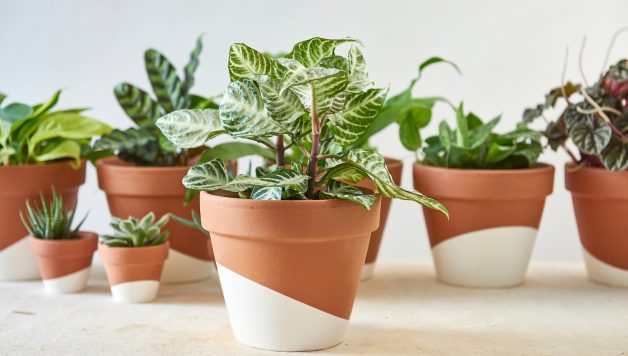Plants Could Help Make You Happy and Healthy (Says Science)
MY FITNESS PAL—Overheard at a Trader Joe’s the other day, two young women were eyeing the beautiful and affordable plant selection, discussing their deep desires to turn their homes into lush green sanctuaries. Then one hesitated and sheepishly admitted she’s a … (hushed tone) plant killer.
In fact, many of us are. Buying an attractive herb, flower, shrub, what have you, is so easy. They look their best and brightest in the shop — how could you not? But their lifespan is often too short and you’re likely to blame. Under- or overwatering, too much sun or too little, and straight-up neglect can instantly dash your dreams of domesticating mother nature.
So what do you do? Like the woman in Trader Joe’s, you pick up a pot, admire it, then politely, return it to the shelf. Or maybe, your relationship with plants becomes purely transactional: You buy, enjoy, let die and replace it like nothing.
GROWING GREENS IS THERAPEUTIC, SAYS SCIENCE
Choosing not to be a plant parent is your prerogative, but it’s also not ideal. It’s a basic human need to be surrounded by, well, living things. Besides the obvious reason — plants provide oxygen — they also promote health benefits a lot of us are not taking advantage of. Doctors are now prescribing nature to patients to counteract the effects of what some are calling “nature deficit disorder.” In other words, we’re spending too much time indoors.
The biggest downside of being inside plant-less places is the increase in both mental and physical stress, reports one study published in the International Journal of Environmental Research and Public Health. Green environments have proven to put people at ease. This randomized trial found park visits lowered stress levels overall. Japanese researchers claim a nature stroll can even boost the immune system. Unfortunately, not everyone has instant access to a forest, garden or even backyard, particularly in major cities. In these cases, creating an indoor green sanctuary is crucial.
A 2016 study published in the Journal of Civil Engineering and Architectural Research showed having houseplants also improved subjects’ mood, focus and productivity. Medium-sized plants made subjects happier than small ones and having at least three or more plants “reduced the feeling of boredom in participants. These facts suggest plants can be a source of fascination … [and according to attention restoration theory] when fascination is stimulated, direct attention is recovered and fatigue is reduced or delayed.”
An unrelated study supported similar findings in hospitals, where “cheerful and inviting” plants captured the attention of recovering patients, who experienced a calming effect and even healed quicker.
KEEP YOUR GREENS FROM TURNING BROWN
In the age of niche communities and ultra-convenient services, there are now several nation-wide houseplant subscription services, like Horti, The Sill and Bloomscape, delivering green goods to your door and teaching you how to keep them alive — and thriving.
“We wanted to curate an experience for people and give them really hearty plants that will build their confidence,’” says Puneet Sabharwal, who co-founded Horti with Bryana Sortino about two years ago after offering horticulture advice to friends for years. Both have a total of 175 plants between their two NYC apartments. That doesn’t count the Horti shipments (about 500 plants, monthly) Sortino stores in her makeshift-warehouse-slash-home. Luckily, they are moving the operation to their first retail space — designed to capture the playful experience of plant ownership, avoiding the transactional — opening in Greenpoint, Brooklyn this spring.
“A lot of the information you gather around plants is really overwhelming. Google ‘plant care’ and you’ll get about 10,000 results offering differing advice,” Sabharwal says. “What we wanted to do is tell people the top two things to keep plants alive.”
For their collection, which consists of 10–15 varieties on the site, Horti focuses on selecting beauties that are resilient. “We pick plants that can handle multiple living situations. They are not the regular variety you can get at your local bodega. They’re more exotic and can handle a little bit of drought if you forgot to water them. They can handle bright light and flourish, but if you can’t put them right by the sill, they will not die immediately,” Sabharwal says.




